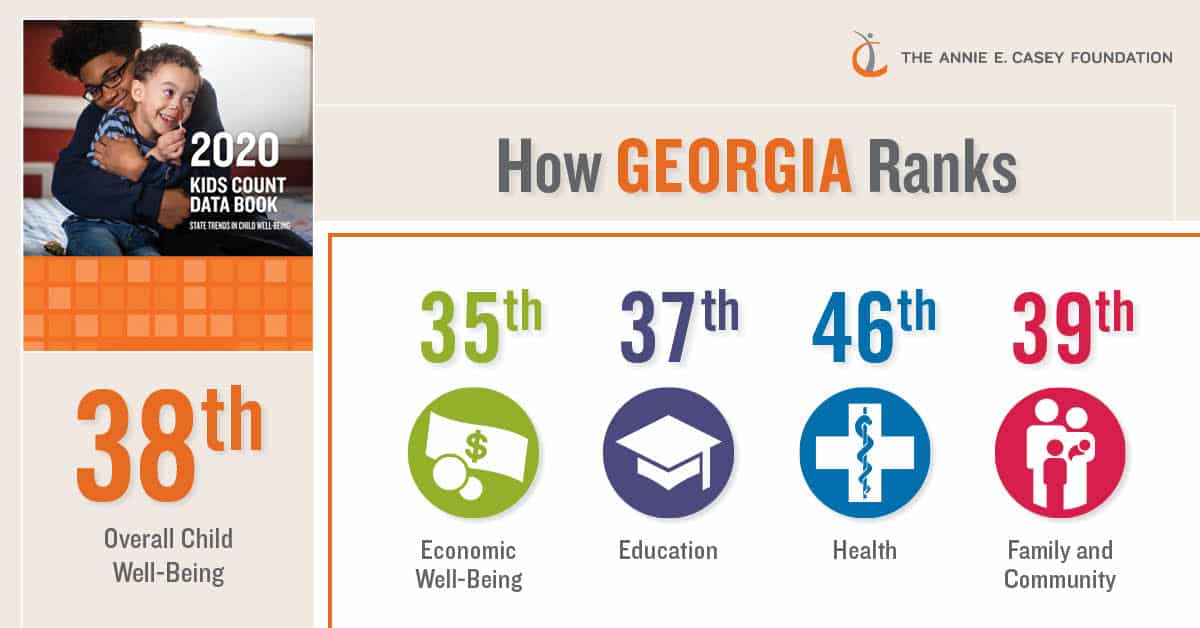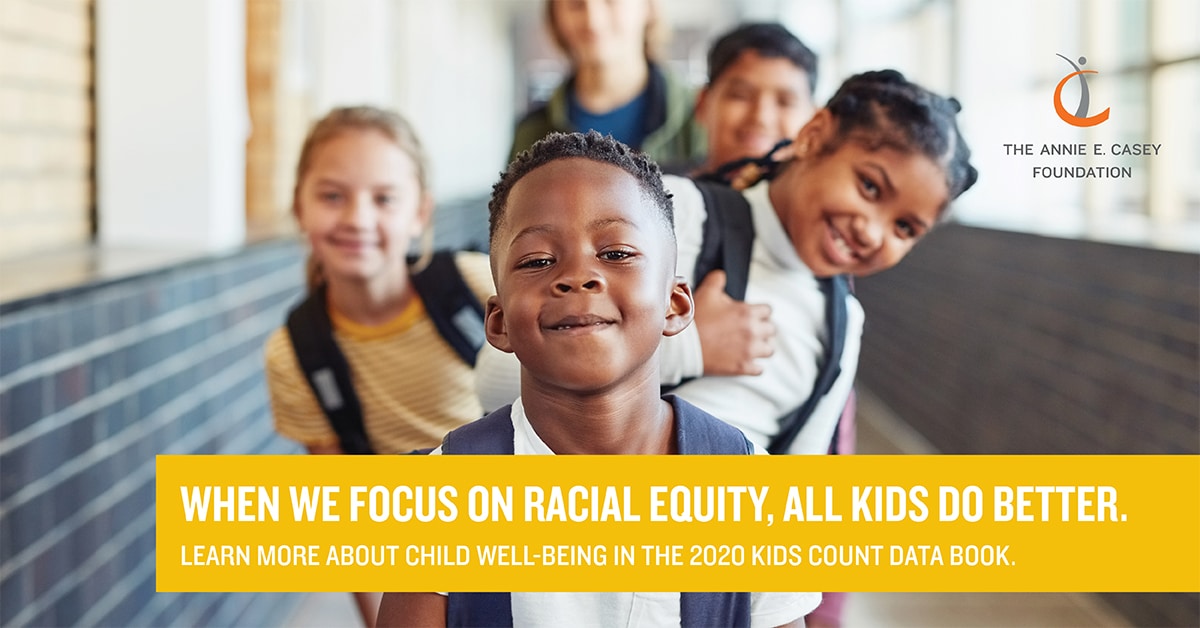Georgia Ranks 38th in the Nation for Child and Family Well-Being
Print This PostAnnually Published Assessment of Child Well-Being Made Available to Ensure Continuity of Access to Data for Policymakers, Advocates
Georgia again ranks 38th in the nation for overall child and family well-being in the latest KIDS COUNT® Data Book, released today by the Annie E. Casey Foundation.
This annually published resource tracks child well-being nationally and state by state and ranks the states by how well they are doing by their children. The Data Book looks at Georgia across four domains—education, economic well-being, health, and family and community—to measure progress and identify areas where this state struggles. For the 2020 report, the newest data are from 2018 and 2019—so they don’t reflect current conditions amidst the threat of the COVID-19 pandemic, but disaggregating the data by race and ethnicity do reflect the tragic effects of systemic racism.
“These data allow us to look at the ways children, families, and communities already had vulnerabilities that affected not only the path of the coronavirus in Georgia, but also how societal inequities and institutionalized racism shape the data we share,” said Georgia Family Connection Partnership (GaFCP) Executive Director Gaye Smith. “So many of the systems represented in these data have been deemed essential amid the coronavirus pandemic—and indeed have always been essential. GaFCP remains committed to working with our statewide network and partners to achieve better outcomes for our most vulnerable children and families, which ultimately will lead to vibrant, healthy communities for the benefit of every Georgian.”
Georgia ranks 35th for economic well-being, 37th for education, and 39th for family and community. The state ranks 46th for health—showing profound vulnerabilities in that domain compared with the rest of the nation.

Georgia ranks 35th in economic well-being
The percentage of children living in poverty declined from 21% in last year’s Data Book to 20% this year. Still, one in five children is growing up in poverty and more than one in four children lived in a family where no parent had full-time, year-round employment. Nearly one-third of Georgia’s children lived in a household with a high housing cost burden.
Georgia ranks 37th in education
The percentage of high school students not graduating on time fell again, from 19% in 2017 to 18% in 2018. However, reading scores did not improve compared to the previous year, with 68% of fourth graders scoring below proficient in reading. In the math domain, 69% of eighth graders scored below proficient compared to the national average of 67%.
“Too many of Georgia’s students arrive at school each day dreading six words: ‘Can you read the next paragraph?’ According to NAEP data, the majority of students are not proficient at reading grade-level texts or completing grade-level tasks that require mathematical thinking. So there are a lot of frustrated students who sit before us each day void of the tools to have full access to the learning,” said Ebony Lee, Clayton County Public Schools assistant superintendent. “Georgia must ensure schools and their communities are well-resourced and equipped with educators who possess the knowledge and skills to teach reading and mathematics in ways that lead to deeper mastery. The future of our economy in Georgia is contingent upon the type of graduate that we produce year after year from all communities. The future starts today.”
Georgia ranks 39th in family and community
The percentage of children growing up in a family where the head of the household lacks a high school diploma remained steady compared to last year at 13%, which matches the national average. The rate of children living in high-poverty areas fell to a 10-year low of 12% but was still above the 2018 national average of 10%.
Georgia ranks 46th in health
Georgia continues to see an increasing low birthweight rate, based on the number of newborns who weighed 5 pounds, 8 ounces or less. The rate was 10.1%—the third-highest in the nation. The percentage of children without health insurance increased to 8%, compared to the national average of 5%. The data also showed that 31% of children in Georgia were overweight or obese, which matches the national average.
“We need to recognize that our families are in crisis. The women who are having low-birthweight babies are not teenagers. They are college educated—but because of the stress in their lives, they are not able to use their education to help themselves and their families,” said Sherry Farr, RN, BSN, county nurse manager, Lamar and Upson County health departments. “We need to do a better job of educating ourselves to understand how families who are struggling live their lives and how we can help them. Listen to families—work with families. Help them understand they won’t be penalized. We need to change the perception families have of organizations and help alleviate fear.”
Beyond this annual Data Book, the Casey Foundation also plans to explore the effects of the pandemic on child well-being in a future report but is releasing the annual Data Book as usual to ensure legislators and other elected officials, policymakers, researchers, and advocates for children have the information they are customarily able to access at this time of year.
In addition to the KIDS COUNT® Data Book, the U.S. Census Bureau’s Household Pulse Survey disseminates data on a range of ways in which people’s lives have been impacted by the pandemic—including loss and expected loss in employment income, food scarcity, delayed medical care, and K–12 educational changes—in near real time to inform federal and state response and recovery planning.
GaFCP also is collecting data from our statewide network to determine how to best support vulnerable communities navigating the COVID-19 crisis across the state. Contact Georgia KIDS COUNT manager Rebecca Rice at rebecca@gafcp.org with data requests.
“Working to keep kids healthy and safe has never been more essential,” said Lisa Hamilton, president and CEO of the Casey Foundation. “Having consistent, reliable data to guide our decisions will be critical as we continue seeking to ensure the well-being of children, families, and communities throughout this challenging time and beyond.”
Download the 2020 KIDS COUNT® Data Book.
Journalists interested in creating maps, graphs, and rankings in stories about the Data Book can use the KIDS COUNT® Data Center at datacenter.kidscount.org.
Contact:
Bill Valladares
GaFCP Communications Director
404-739-0043
william@gafcp.org
Follow us on Twitter: @gafcpnews
Connect with us on Facebook.
Georgia Family Connection Partnership (GaFCP) is a public-private partnership created by the State of Georgia and investors from the private sector to assist communities in addressing the serious challenges facing children and families. GaFCP also serves as a resource to state agencies across Georgia that work to improve the conditions of children and families. Georgia KIDS COUNT provides policymakers and citizens with current data they need to make informed decisions regarding priorities, services, and resources that impact Georgia’s children, youth, families, and communities. Georgia KIDS COUNT is funded, in part, through a grant from The Annie E. Casey Foundation, a private charitable organization dedicated to helping build better futures for disadvantaged children in the United States.
The Annie E. Casey Foundation creates a brighter future for the nation’s children by developing solutions to strengthen families, build paths to economic opportunity and transform struggling communities into safer and healthier places to live, work and grow. KIDS COUNT® is a registered trademark of the Annie E. Casey Foundation.

